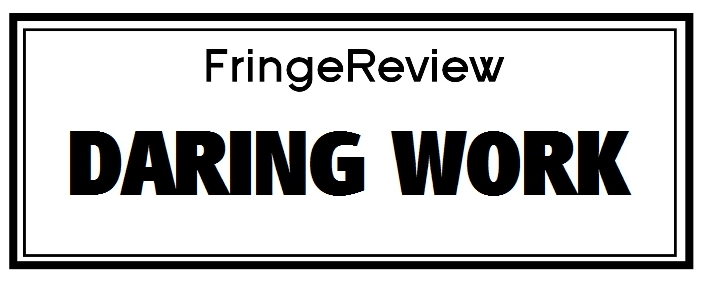Edinburgh Fringe 2018
Old Boy
Glas(s) Performance

Genre: Contemporary, Storytelling
Venue: Scottish Storytelling Centre
Festival: Edinburgh Fringe
Low Down
A moving yet very natural and utterly compelling piece of storytelling that examines the real-life relationship between three grandfathers and their two, twelve and twenty-two year old grandsons.
Review
An old man sits, cross legged on the floor. There’s a cardboard Wendy House behind him, toddler toys scattered around. There’s a toddler tottering around playing with the toys, completely oblivious to the packed Netherbrow Theatre down at the Scottish Storytelling Centre. The old man and the toddler converse, a private conversation in the glare of stage lights and an intrigued audience.
So starts Old Boy, a series of three duologues between three grandfathers and their grandsons. It’s a show about a quite a lot of things, including legacy, inheritance and a shared sense of history. It’s about ageing and how relationships evolve as people age. It’s also about love and tenderness between men and about making memories together. But above all, it’s a show about real people on a stage, being themselves. What gives this show the considerable impact it has is that the participants are not actors. Nor are they acting.
Peter Hennessey was evidently thrilled to become a grandfather two years ago. Having never been near a nappy when his own children were growing up (Scottish ‘men’ just didn’t do that in the 1980’s, did they?) he’s the first to admit that Sam’s arrival has completely changed his outlook on life. Sam seems pretty keen on the relationship as well, completely at home with his grandad on stage, content in his own little bubble.
Working with a two year old is probably the ultimate improv challenge but this was ten minutes of heart-warming interaction between two people clearly besotted with each other. Hennessey’s gentle, laconic story of becoming a grandad was punctuated with golden silences as he dealt tenderly with the needs of his two year old bundle of joy, before trigger music caught the young lad’s attention and he departed the stage for his morning nap. Priceless.
Enter twelve year old Kai Johnstone to clear up the toys and introduce us to his Papa via a pithy, droll monologue that evoked a real love and tenderness that became apparent as soon as a clearly nervous Les Johnstone ventured into the lights. Cue twenty minutes of captivating dialogue between the two of them and a quite deep exploration of what it means to be a grandson as well as what it means to be a grandad. Rhetorical questions from grandson exposed and explored some difficult periods of grandfather’s life, introducing a pathos and poignancy to proceedings that had a few reaching into their pockets for something with which to wipe their eyes. The physical empathy between them was also so natural and touching – it was the antithesis of a performance, just two people very much in love with each other, very comfortable in each other’s presence and respectful of each other’s point of view.
So to the third duologue. Except it wasn’t a duologue due to the unfortunate (and unexplained) absence of the older of the two Eoin’s due to appear on stage. So it was left to the twenty-two year old Eoin to carry the can, which he initially did with some aplomb, especially given what he had to follow. However, in some ways this final part seemed almost too polished, the delivery too slick, more a performance than a continuation of the natural conversations that had preceded it. This had the unintended and unfortunate effect of pricking the rather tender atmosphere created by the earlier pairings, especially when audience members were deployed as stand-ins for parts clearly intended to be delivered by Eoin senior. It was no-one’s fault but perhaps this was another case of less is more and the material could have simply been omitted. But that should in no way take away from what was, overall, a tender, moving yet very natural and utterly compelling piece of storytelling.
Staging this took courage for both the production team and participants. It’s a daunting prospect, being asked to talk about what are essentially private, familial relationships in front of a bunch of people you don’t know. How would they react? Would they even be remotely interested? And this was a risky project for any director to try and stage in a way that could draw out the bond between the generations in a natural way.
It could so easily have all collapsed in chaos. Or tears. Or both. But it didn’t. That’s because what we saw was real. Real people, interacting naturally, telling stories of their ordinary, real lives. Extraordinary.


















































